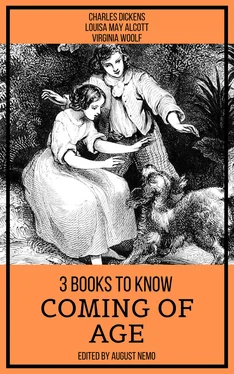"Good-bye, Pip!" said Miss Havisham. "Let them out, Estella."
"Am I to come again, Miss Havisham?" I asked.
"No. Gargery is your master now. Gargery! One word!"
Thus calling him back as I went out of the door, I heard her say to Joe, in a distinct emphatic voice, "The boy has been a good boy here, and that is his reward. Of course, as an honest man, you will expect no other and no more."
How Joe got out of the room, I have never been able to determine; but, I know that when he did get out he was steadily proceeding up-stairs instead of coming down, and was deaf to all remonstrances until I went after him and laid hold of him. In another minute we were outside the gate, and it was locked, and Estella was gone.
When we stood in the daylight alone again, Joe backed up against a wall, and said to me, "Astonishing!" And there he remained so long, saying "Astonishing" at intervals, so often, that I began to think his senses were never coming back. At length he prolonged his remark into "Pip, I do assure you this is as-TONishing!" and so, by degrees, became conversational and able to walk away.
I have reason to think that Joe's intellects were brightened by the encounter they had passed through, and that on our way to Pumblechook's he invented a subtle and deep design. My reason is to be found in what took place in Mr. Pumblechook's parlour: where, on our presenting ourselves, my sister sat in conference with that detested seedsman.
"Well?" cried my sister, addressing us both at once. "And what's happened to you? I wonder you condescend to come back to such poor society as this, I am sure I do!"
"Miss Havisham," said Joe, with a fixed look at me, like an effort of remembrance, "made it wery partick'ler that we should give her—were it compliments or respects, Pip?"
"Compliments," I said.
"Which that were my own belief," answered Joe—"her compliments to Mrs. J. Gargery—"
"Much good they'll do me!" observed my sister; but rather gratified too.
"And wishing," pursued Joe, with another fixed look at me, like another effort of remembrance, "that the state of Miss Havisham's elth were sitch as would have—allowed, were it, Pip?"
"Of her having the pleasure," I added.
"Of ladies' company," said Joe. And drew a long breath.
"Well!" cried my sister, with a mollified glance at Mr. Pumblechook. "She might have had the politeness to send that message at first, but it's better late than never. And what did she give young Rantipole here?"
"She giv' him," said Joe, "nothing."
Mrs. Joe was going to break out, but Joe went on.
"What she giv'," said Joe, "she giv' to his friends. 'And by his friends,' were her explanation, 'I mean into the hands of his sister Mrs. J. Gargery.' Them were her words; 'Mrs. J. Gargery.' She mayn't have know'd," added Joe, with an appearance of reflection, "whether it were Joe, or Jorge."
My sister looked at Pumblechook: who smoothed the elbows of his wooden armchair, and nodded at her and at the fire, as if he had known all about it beforehand.
"And how much have you got?" asked my sister, laughing. Positively, laughing!
"What would present company say to ten pound?" demanded Joe.
"They'd say," returned my sister, curtly, "pretty well. Not too much, but pretty well."
"It's more than that, then," said Joe.
That fearful Impostor, Pumblechook, immediately nodded, and said, as he rubbed the arms of his chair: "It's more than that, Mum."
"Why, you don't mean to say—" began my sister.
"Yes I do, Mum," said Pumblechook; "but wait a bit. Go on, Joseph. Good in you! Go on!"
"What would present company say," proceeded Joe, "to twenty pound?"
"Handsome would be the word," returned my sister.
"Well, then," said Joe, "It's more than twenty pound."
That abject hypocrite, Pumblechook, nodded again, and said, with a patronizing laugh, "It's more than that, Mum. Good again! Follow her up, Joseph!"
"Then to make an end of it," said Joe, delightedly handing the bag to my sister; "it's five-and-twenty pound."
"It's five-and-twenty pound, Mum," echoed that basest of swindlers, Pumblechook, rising to shake hands with her; "and it's no more than your merits (as I said when my opinion was asked), and I wish you joy of the money!"
If the villain had stopped here, his case would have been sufficiently awful, but he blackened his guilt by proceeding to take me into custody, with a right of patronage that left all his former criminality far behind.
"Now you see, Joseph and wife," said Pumblechook, as he took me by the arm above the elbow, "I am one of them that always go right through with what they've begun. This boy must be bound, out of hand. That's my way. Bound out of hand."
"Goodness knows, Uncle Pumblechook," said my sister (grasping the money), "we're deeply beholden to you."
"Never mind me, Mum," returned that diabolical corn-chandler. "A pleasure's a pleasure, all the world over. But this boy, you know; we must have him bound. I said I'd see to it—to tell you the truth."
The Justices were sitting in the Town Hall near at hand, and we at once went over to have me bound apprentice to Joe in the Magisterial presence. I say, we went over, but I was pushed over by Pumblechook, exactly as if I had that moment picked a pocket or fired a rick; indeed, it was the general impression in Court that I had been taken red-handed, for, as Pumblechook shoved me before him through the crowd, I heard some people say, "What's he done?" and others, "He's a young 'un, too, but looks bad, don't he?" One person of mild and benevolent aspect even gave me a tract ornamented with a woodcut of a malevolent young man fitted up with a perfect sausage-shop of fetters, and entitled, TO BE READ IN MY CELL.
The Hall was a queer place, I thought, with higher pews in it than a church—and with people hanging over the pews looking on—and with mighty Justices (one with a powdered head) leaning back in chairs, with folded arms, or taking snuff, or going to sleep, or writing, or reading the newspapers—and with some shining black portraits on the walls, which my unartistic eye regarded as a composition of hardbake and sticking-plaister. Here, in a corner, my indentures were duly signed and attested, and I was "bound;" Mr. Pumblechook holding me all the while as if we had looked in on our way to the scaffold, to have those little preliminaries disposed of.
When we had come out again, and had got rid of the boys who had been put into great spirits by the expectation of seeing me publicly tortured, and who were much disappointed to find that my friends were merely rallying round me, we went back to Pumblechook's. And there my sister became so excited by the twenty-five guineas, that nothing would serve her but we must have a dinner out of that windfall, at the Blue Boar, and that Pumblechook must go over in his chaise-cart, and bring the Hubbles and Mr. Wopsle.
It was agreed to be done; and a most melancholy day I passed. For, it inscrutably appeared to stand to reason, in the minds of the whole company, that I was an excrescence on the entertainment. And to make it worse, they all asked me from time to time—in short, whenever they had nothing else to do—why I didn't enjoy myself. And what could I possibly do then, but say I was enjoying myself—when I wasn't?
However, they were grown up and had their own way, and they made the most of it. That swindling Pumblechook, exalted into the beneficent contriver of the whole occasion, actually took the top of the table; and, when he addressed them on the subject of my being bound, and had fiendishly congratulated them on my being liable to imprisonment if I played at cards, drank strong liquors, kept late hours or bad company, or indulged in other vagaries which the form of my indentures appeared to contemplate as next to inevitable, he placed me standing on a chair beside him, to illustrate his remarks.
Читать дальше












